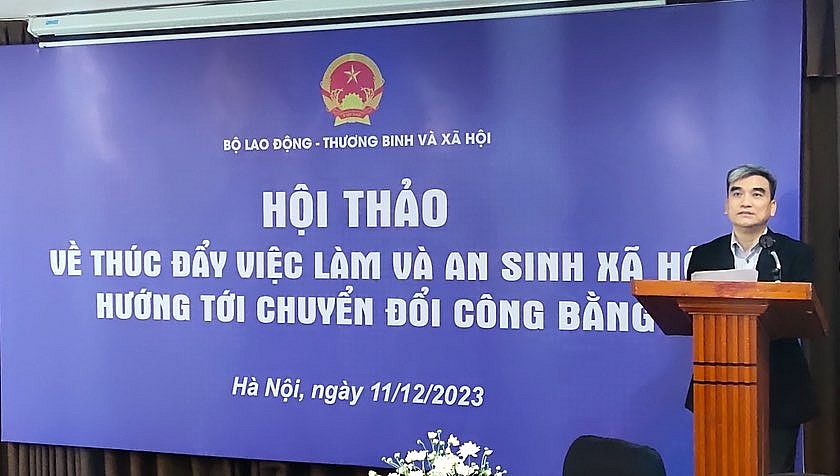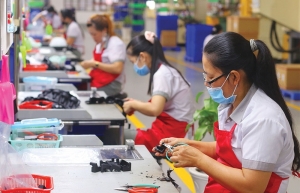Labour market can evolve through just transition
At the workshop on promoting employment and social protection towards a just transition, held on December 11 by the Ministry of Labour, Invalids, and Social Affairs (MoLISA), consensus among experts emerged on the need to create policies ensuring that vulnerable workers receive retraining opportunities and support for a seamless transition into new employment.
 |
Luu Quang Tuan, director general of the International Cooperation Department at the MoLISA, emphasised that as Vietnam aligns with nearly 150 countries committed to achieving net-zero and undergoes a shift towards a green economy, it is crucial to navigate this process with justice and equity at its core.
Recognising potential disparities across sectors and communities, especially impacting vulnerable groups, Tuan highlighted aspects such as job mobility, job loss, skills shortages, and the misalignment between existing workforce skills and the requirements of the green economy.
“The MoLISA acknowledges that the energy transition process can create unfair impacts, particularly affecting the poor and lowest income groups, such as challenges in affording clean and green energy,” he noted.
Trinh Thi Nguyet, representative of the Department of Social Protection at the MoLISA, presented statistics suggesting that the current demographic of disadvantaged, vulnerable, and low-income individuals in Vietnam constitutes over one-quarter of the population.
“Vietnam is experiencing one of the swiftest rates of population ageing globally. Projections indicate that by 2035, approximately 20 per cent of Vietnam’s population will be elderly, and by 2025, this demographic is expected to reach 30 per cent of the total population,” she said.
To provide a case study of energy transition’s impact towards vulnerable groups, she illustrated the necessity of social protection measures for older workers in coal-fired thermal power plants undergoing conversion or downsizing.
“Certain workers facing job loss, such as older employees in these thermal power plants, will necessitate specific forms of social protection. This includes provisions such as unemployment benefits, paid time off, early retirement options for formal workers, and social benefits for informal workers,” she explained.
“Additionally, for a different segment of the workforce, implementing job creation and retraining programmes becomes imperative to facilitate their re-employment, particularly within alternative facilities or the broader energy industries.”
From the perspective of an international organisation, Do Le Thu Ngoc, assistant resident representative and head of the Inclusive Growth Unit at United Nations Development Programme in Vietnam, referenced Indonesia’s just transition framework, which comprises the key criteria of human rights, gender equality and empowerment, accountability, leaving no-one behind, and sustainability and resilience.
Ngoc emphasised a significant component of the framework, involving public-private partnerships, collaboratively identifying human resource training needs with businesses and engaging with the community to address concerns. However, she clarified that there’s no one-size-fits-all solution for just transition.
“The employment shift is not merely a job-by-job exchange. Rather, it involves anticipating new skill requirements during the transition, establishing institutions, and providing training for these evolving skills,” she said.
Offering specific recommendations for Vietnam, Ngoc suggested that the country should proactively reform its social assistance and social security system to mitigate the potential increase in poverty resulting from the energy transition. In the short term, she proposed supporting vulnerable households grappling with escalating energy and food prices, while in the long term, reinforcing resilience, social security, and employment, along with allocating a higher budget for social security.
“Social security mechanisms have a crucial role in garnering public support for green transition and climate policies,” she said, highlighting the distinction between social security, such as unemployment compensation, and social investment through skills training, underscoring their unique contributions to the overall strategy.
On the domestic front, the government is also actively prioritising a just transition. Chu Thi Lan, representative of the MoLISA’s Institute of Labour Sciences and Social Affairs, underscored the significant adjustments required for the energy, transportation, and manufacturing sectors when shifting to a net-zero emissions economy.
Anticipating potential workforce displacement, she emphasised the need for well-defined policies ensuring affected workers in these industries have access to retraining and comprehensive support for a successful transition to new employment.
“With regards to the Just Energy Transition Partnership, the MoLISA holds several significant responsibilities, including chairing and collaborating with relevant ministries and agencies to formulate mechanisms, policies, and solutions that facilitate an equitable transition, with an emphasis placed on adapting to climate change and ensuring fairness in the energy transition process,” she said.
 | Green transition placing pressure on labour market Vietnam has a mountain to climb to create enough qualified workers for new roles in the country’s green energy transition. |
 | Drastic moves vital for labour capacity The government is being urged to find ways to improve the country’s labour productivity, which is a large condition for attracting more high-quality investment, which is now on a downtrend. |
What the stars mean:
★ Poor ★ ★ Promising ★★★ Good ★★★★ Very good ★★★★★ Exceptional
Related Contents
Latest News
More News
- SK Innovation-led consortium wins $2.3 billion LNG project in Nghe An (February 25, 2026 | 07:56)
- THACO opens $70 million manufacturing complex in Danang (February 25, 2026 | 07:54)
- Phu Quoc International Airport expansion approved to meet rising demand (February 24, 2026 | 10:00)
- Bac Giang International Logistics Centre faces land clearance barrier (February 24, 2026 | 08:00)
- Bright prospects abound in European investment (February 19, 2026 | 20:27)
- Internal strengths attest to commitment to progress (February 19, 2026 | 20:13)
- Vietnam, New Zealand seek level-up in ties (February 19, 2026 | 18:06)
- Untapped potential in relations with Indonesia (February 19, 2026 | 17:56)
- German strengths match Vietnamese aspirations (February 19, 2026 | 17:40)
- Kim Long Motor and AOJ Suzhou enter strategic partnership (February 16, 2026 | 13:27)

 Tag:
Tag:




















 Mobile Version
Mobile Version